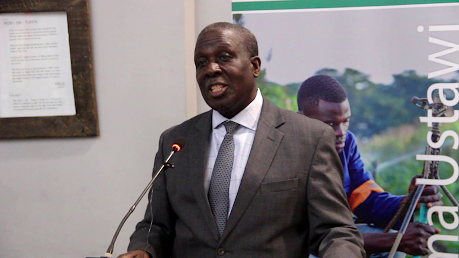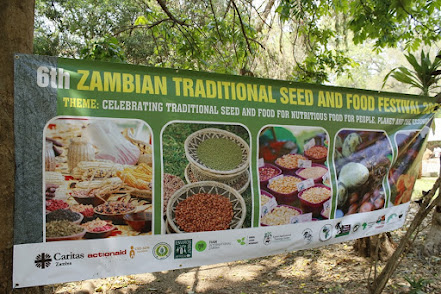RUBEN MTOLO CALLS FOR THE PROMOTION OF CLIMATE SMART AGRICULTURE ,REAFFIRMS GOVT’S RESOLVE TO DEVELOP FARM BLOCKS
Agriculture Minister Ruben Mtolo has challenged the private sector, Civil Society Organisations and some farmers' organisations among other stakeholders to ensure that they promote climate-smart agriculture in the country by introducing innovations such as tolerant crop varieties, improved soil management, agro forest and irrigation practices and mechanization.
Mr Mtolo said this today(18-08-2022) at the National Policy Dialogue Meeting for the Launch of th le Ukama Ustawi-UU initiative on diversification for resilient Agri-food systems in East and Southern Africa held in Lusaka today hosted by the Agriculture consultative forum and the food agriculture and national resources policy analysis network.
The Minister noted that given that a majority of farmers are subsistence and smallholder who depend on rain-fed agriculture, the increased frequency and intensity of extreme weather events has posed a major threat to food security as it has shifted planting cycles thereby making it difficult for farmers to plan ahead.
Mr Mtolo said this is a clear indication that a transformative approach is required for the agriculture sector hence the government is promoting conservation agriculture as an approach to increase agricultural productivity food and Nutrition security while addressing the impact of climate vulnerability and extreme weather events.
"Agriculture in Zambia like in most countries in the Eastern and Southern African region is highly vulnerable to the impacts of climate change. The country is already experiencing weather vulnerability and climate change, induced hazards due to droughts, dry spells, seasonal and flash floods, extreme temperatures and changes in rainy patterns. Some of these hazards such as droughts and floods have increased in frequency and intensity over the past few decades and have adversely impacted food and nutrition security, water security and quality, energy and livelihoods of the people, especially in rural communities. The Ministry and other stakeholders have therefore developed a framework to guide the coordination and implementation of conservation agriculture aimed at enhancing the implementation of a second national agriculture policy in order to achieve sustainable agriculture transformation that will result in significant growth ot the agriculture sector, increased income for farming households, improved food and nutrition security and agricultural exports. Other policy instruments that the framework will enhance include, the Eighth National Development Plan, the Second Generation National Agriculture Investment Plan,[which is ]currently under preparation and Climate Smart Agriculture Investment among others," the Minister stated.
He said, "I am therefore delighted to learn that the UU initiative of the Consultative Group on International Agriculture Research-CIGAR systems organisation is designed to support climate resilient agriculture livelihoods and agri-business, ecosystems in our countries by helping vulnerable smallholder [farmers] to transition from the maize mixed system to sustainably, intensified, diversified and de-risked agro-food system with a strong maize base."
"Here in this country our staple food is maize, we eat of a lot of maize,....we take a group of about 19 million Zambians we eat not less than 3 million tons of maize annually. Now the issue is who produces this maize?..... Because of policies which were not very positive, the large-scale farmers whose productivity is very high moved away from maize production...It is the small-scale farmers who are producing maize .96 percent of our maize production is now by small-scale farmers who are the least in productivity at output per hectare of fewer than two tons, for every hectare which is a disaster. Therefore when we have a group like this one seating and looking at systems that can improve that we[the ministry] become very excited...because this will complement government's efforts of promoting smallholder agriculture"
At the same meeting, the Minister disclosed that the ministry wants to adopt a system of developing farm blocks by promoting irrigation farming, and mechanisation as well as improving extension service.
"Zambia is zoned into small areas called farm blocks. So what we have done is that in each province we have identified over and above what is happening, we have identified 100 thousand hectares of land which we want to develop and use and use it as a model of development in our agricultural process. We want small-scale farmers who should be grouped together in an outgrower type of program linked to a large-scale farmer who would bring processing facilities to enhance production. we are absolutely serious with this program of farm block and we have opened it not only to Zambians but even to the world. I will give you a practical example ...Do we have colleagues from Rwanda here, okay I see none, but I will still talk about it..Sometime next week we are expecting a group from Rwanda, they have asked for land from Zambia and we are going to give them a minimum of 5 thousand hectares. We would give easily whatever hectares they ask. So our brothers from Rwanda will come and will give them a piece of land and I have already identified where I will take them....They want so much I will double it ...I will give them twice what they want...one near Lusaka and another one near the lake which borders East Africa so that they can easily transport what they want to grow to Rwanda. Here because we have a railway line, they can easily move via road and railway to Rwanda. So they can produce for Rwanda and leave what they can, that is how open we are. So even you colleagues as you are seated here, if you are interested in production in our country, you are free to come and will give you land, with a good tenure system and allow you to produce. So what will do in these farm blocks, we are going to provide roads, small airstrips and other social amenities which will enhance agriculture," he assured.
He added that "our farm blocks were very well selected, there is a lot of water in these farm blocks because one of the things we are looking for is irrigation. We are failing to farm properly in this country because we are not using the water properly. Meanwhile, we have plenty of water. So we want to go into irrigation,.....all forms of irrigation such as drip irrigation farrows, canals sprinklers centre pivot among others. So the government will be facilitating the opening of these areas. The other thing we could like to do which I was seeing the fora is looking at mechanisation. But our mechanisation we do not want to look just at truckers because the levels of poverty are high and some of our farmers can not afford to buy truckers."
"The third thing we want to do in farm block is extension services. we are very very poor in extension and I think the average extension figure which we are looking at in our country is one extension officer to 400 farmers. But right now the situation is, one extension officer to one thousand five hundred or two thousand farmers , it is simply unattainable."
He indicated that the government want to see the value chain complete and has since embarked on the processing of agricultural products in order to sell processed food.
And speaking at the same event Agriculture Consultative Forum Board Chairperson James Kasongo explained that the purpose of the National Policy Dialogue is to present the East and Southern African policy hub to stakeholders in Zambia.
Mr Kasongo added that the other purpose of the National Policy Dialogue is to disseminate and validate findings of a stakeholder and policy mapping exercise on the status of Zambia's agriculture and food systems-related policies and to discuss pressing issues relating to agri-food systems diversification and resilience building.
"The UU initiative is a CGIAR Regional Integrated Initiative being led by the International Water Management Institute in collaboration with regional and national partners, including ACF and Food, Agriculture and Natural Resources Policy Analysis Network. The UU initiative will support 12 East and Southern African Countries including Zambia. It will help millions of vulnerable smallholders in the targeted countries to transition from maize-mixed systems to sustainably intensified, diversified and de-risked agrifood systems with a strong maize base."
And speaking during a consultative Group on International Agricultural Research-CGIAR and building Systematic Resilience Against Climate Variability and Extremes-ClimBer National inception for Zambia held in Lusaka Zambia, Water Resources Management Authority-WARMA noted with concern that the country had not invested in building small dams over the years.
WARMA Water Resources Management and Information Director Chewe Chishala called for investment in this area for the country to facilitate rainy water harvesting.
And ClimBer Co lead John Hellin affirmed the organisation's resolve to contribute to Zambia's Climate adaptation measures.
He stressed the need to increase early warning systems and increase access to climate financing among others.
The ClimBeR Initiative aims to transform the climate adaptation capacity of food, land, and water systems in Zambia and five other low- and middle-income countries, ultimately increasing the resilience of smallholder production systems to withstand severe climate change effects like drought, flooding, and high temperatures.



Comments
Post a Comment